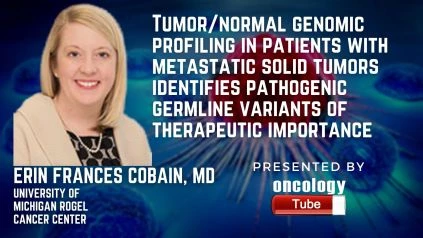Erin Frances Cobain, MD, Clinical Lecturer, University of Michigan Rogel Cancer Center speaks about the ASCOPubs Article – Tumor/normal Genomic Profiling In Patients With Metastatic Solid Tumors Identifies Pathogenic Germline Variants Of Therapeutic Importance.
Link to Article:
https://ascopubs.org/doi/abs/10.1200/JCO.2020.38.15_suppl.1501
Abstract:
Background:
Patients are frequently referred to clinical trials of targeted medicines based on tumor genetic profiling using next-generation sequencing (NGS). Incidental pathogenic germline variations (PGVs) are discovered during NGS testing of paired tumor/normal samples, which could have serious consequences for patients and their families.
Methods:
The Michigan Oncology Sequencing study sequenced the exome and transcriptome of matched tumor/normal samples for 1,015 patients with metastatic, resistant solid malignancies from 2011 to 2018. The treating oncologist was informed of any PGVs discovered that enhanced cancer risk or were linked to particular autosomal recessive disorders. Every three months, chart reviews were performed to see if the discovery of PGV had an impact on treatment decisions. PGVs were found in 160 different patients, yielding a total of 169 PGVs (15.8 percent of cohort). In the tumors of 69 PGVs (41%), there was an evident somatic second hit event. PGVs linked to abnormalities in double-strand DNA repair (BRCA1, BRCA2, ATM, PALB2, BRIP1) or DNA mismatch repair (MLH1, MSH2, and PMS2) were found in 49 individuals (5 percent of the cohort, 31% of patients with PGVs), 37 of whom had never been detected before. Cancer types not frequently associated with hereditary breast-ovarian cancer or Lynch syndromes, such as cancers of uncertain primary origin and sarcomas, were shown to have 14 PGVs in DNA double-strand repair and 7 PGVs in DNA mismatch repair. On the basis of a PGV in DNA repair, 7 patients received a PARP inhibitor (PARPi), 3 patients received an immune checkpoint inhibitor (ICI), and 1 patient received both PARPi and ICI therapy. Clinical effect was achieved in 6 patients with a treatment duration of fewer than 6 months. A patient with cancer of unclear primary etiology and PGV in MSH2 responded well to ICI therapy, with a full response that lasted 23 months.
Conclusions:
PGVs was discovered in roughly 1 in every 6 patients with metastatic solid tumors using targeted NGS of matched tumor/normal samples. PGVs are linked to a somatic second hit in the tumor in about 40% of cases, implying that they play a role in tumor etiology. In patients with a variety of cancer types, unexpected PGVs with therapeutic implications have been discovered, allowing for the adoption of targeted medicines with the potential for significant clinical benefit. Given this finding, all patients with metastatic solid tumor malignancies should be tested for PGVs in DNA repair genes.

